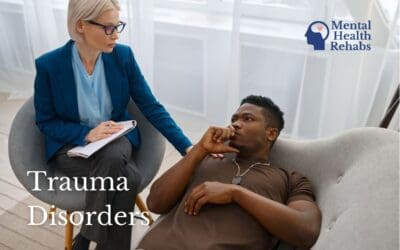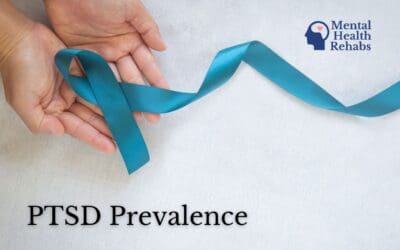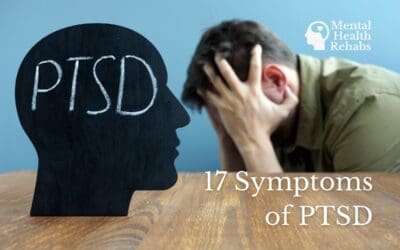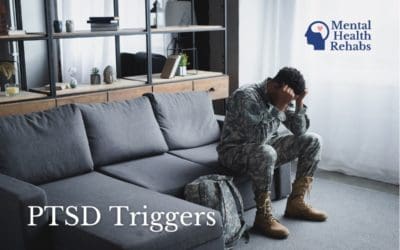Post-Traumatic Stress Disorder.

What is PTSD?
Post-traumatic stress disorder (PTSD) is a mental health condition that occurs after experiencing or witnessing a life-threatening event, like war combat, a natural disaster, physical assault, or a car accident. This feeling triggers the body’s natural fight-or-flight response when people are in danger to protect us from harm. However, someone with PTSD might have this function altered and feel stressed, frightened, or anxious even when they’re not in danger.
Criteria for PTSD Diagnosis
A mental health specialist will use various diagnostic tools to evaluate your symptoms and determine if you meet the criteria for a PTSD diagnosis. The Diagnostic and Statistical Manual (DSM) of mental disorders outlines the criteria for diagnosing this disorder. According to the manual, a person must meet all these requirements:
- Experience PTSD symptoms for more than one month.
- Direct or indirect exposure to a traumatic event.
- Persistently re-experiencing the traumatic event through flashbacks, nightmares, or upsetting memories.
- Trauma-related thoughts or feelings.
- Inability to recall key aspects of the traumatic event.
- Feeling isolated and a decreased interest in previously enjoyable activities.
- Irritability or aggression, alongside risky behavior.
- Hypervigilance and a heightened startle reaction.
Some people might not meet the criteria for PTSD but still struggle with symptoms of surviving a traumatic event. In this case, they may have an acute stress disorder (AUD). These symptoms tend to resolve within weeks and include similar symptoms to PTSD with the exception of the avoidance symptoms.
Symptoms Unique to PTSD
Symptoms of PTSD can appear immediately after the trauma or be delayed for months or years. Although symptoms may ease as you cope with the event’s consequences, a person diagnosed with PTSD will usually experience symptoms for many months or years without treatment. Because PTSD co-occurs with other mental health conditions such as anxiety and depression, it shares many of the same symptoms. However, there are some particular symptoms unique to a PTSD diagnosis, including:
- Having recurring and involuntary distressing memories, including flashbacks of the trauma, intrusive thoughts, and nightmares.
- Avoiding certain places or objects that can be reminders of the traumatic event. People will often actively avoid and stay away from a place or person that might trigger symptoms.
- Cognitive symptoms include having trouble recalling the event, negative thoughts about oneself, and out-of-body experience or feeling the world isn’t real.
- Arousal symptoms include hypervigilance or being startled by stimuli that simulate the trauma.
- Difficulty sleeping or having outbursts of anger.
Treating PTSD
The course of treatment varies depending on the individual, but most people will improve after several weeks of therapy. Some people may experience long-term problems that don’t disappear entirely even after years of recovery time and treatment. While PTSD cannot be cured, it can be treated and managed with:
Psychotherapy
Psychotherapy, including cognitive processing therapy and group therapy. Other psychotherapies include cognitive processing therapy (CPT), cognitive behavioral therapy (CBT), and eye movement desensitization and reprocessing (EMDR).
Medications
Self-Management
PTSD and Substance Abuse
Both addiction and PTSD cause severe changes in brain chemistry. About three-quarters of those surviving violent or abusive trauma report substance use disorders. Many individuals with PTSD turn to alcohol or other drugs to increase endorphin levels and cope with their symptoms. Over time, they become reliant on drugs to relieve all their anxiety, depression, and irritability symptoms.
PTSD might also co-occur with anxiety disorders, obsessive-compulsive disorders, borderline personality disorder, and depression. All of these disorders are complex to treat and recover from. However, psychotherapies, medication, and group therapy can help people find long-lasting recovery. When treating co-occurring disorders like PTSD and substance abuse, it’s essential to find a center providing dual diagnosis treatment programs. Treating both conditions simultaneously can be a practical part of recovery, and it also offers the best chance of sobriety.
If you or someone you know is dealing with PTSD, speak with an addiction specialist or your primary care doctor to learn more about overcoming PTSD with a co-occurring substance use disorder.
Related Articles
7 Types of Trauma Disorders
Trauma comes in different faces and forms. At its most basic level, trauma is a response to a deeply distressing or disturbing experience. These experiences can be a one-time event like an accident or prolonged periods of stress, such as ongoing domestic abuse or...
How Common is PTSD Really?
At least 6 out of every 100 people in the US will experience PTSD at some point in their lives. While Post-Traumatic Stress Disorder (PTSD) is often associated with war veterans, it’s a mental health condition that affects millions of people of all ages, gender, and...
What Are The 17 Symptoms of PTSD?
Post-Traumatic Stress Disorder (PTSD) is a complex mental health condition that can develop after experiencing or witnessing a traumatic event. It can affect anyone who has gone through a distressing or life-threatening situation, such as military combat, natural...
6 Tips on How to Deal With PTSD Triggers
Post-traumatic stress disorder is estimated to affect between 7 and 8% of the U.S. population. It’s not limited to those who have experienced military combat and could very possibly be affecting your friends, family, and coworkers. Whether you or a loved one has been...
Don’t Struggle Alone.
Get Help Today.
Reaching out for help for yourself or a loved one can be overwhelming and stressful, but it doesn’t have to be. If you are struggling to find the right help, or even know where to get started, please feel free to call our 24/7 helpline.
Begin your mental health journey right now!





